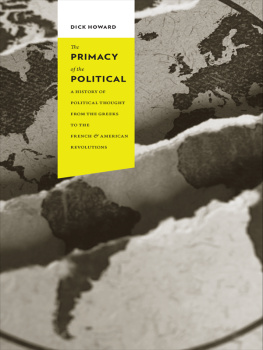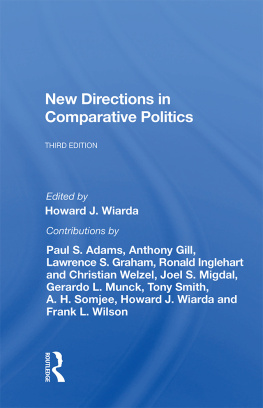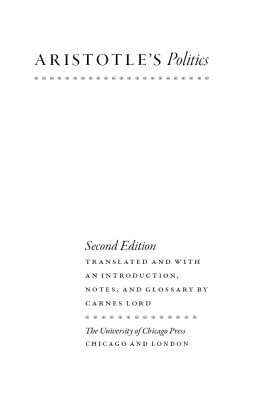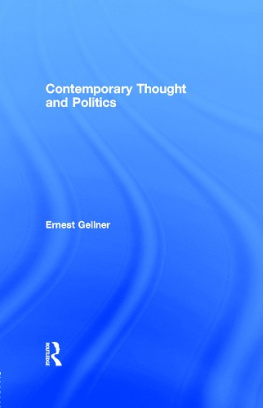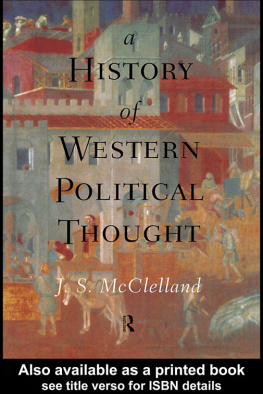The Primacy of the Political
COLUMBIA STUDIES IN
POLITICAL THOUGHT / POLITICAL HISTORY
COLUMBIA STUDIES IN POLITICAL THOUGHT / POLITICAL HISTORY
Dick Howard, General Editor

Columbia Studies in Political Thought / Political History is a series dedicated to exploring the possibilities for democratic initiative and the revitalization of politics in the wake of the exhaustion of twentieth-century ideological isms. By taking a historical approach to the politics of ideas about power, governance, and the just society, this series seeks to foster and illuminate new political spaces for human action and choice.

PIERRE ROSANVALLON,
Democracy Past and Future, edited by Samuel Moyn (2006)
CLAUDE LEFORT,
Complications: Communism and the Dilemmas of Democracy, translated by Julian Bourg (2007)
BENJAMIN R. BARBER,
The Truth of Power: Intellectual Affairs in the Clinton White House (2008)
ANDREW ARATO,
Constitution Making Under Occupation: The Politics of Imposed Revolution in Iraq (2009)

COLUMBIA UNIVERSITY PRESS
Publishers Since 1893
New York Chichester, West Sussex
cup.columbia.edu
Copyright 2010 Columbia University Press
All rights reserved
E-ISBN 978-0-231-50975-6
Library of Congress Cataloging-in-Publication Data
Howard, Dick, 1943
The primacy of the political : a history of political thought from the Greeks to the French and American revolutions / Dick Howard.
p. cm. (Columbia studies in political thought / political history)
Includes bibliographical references and index.
ISBN 978-0-231-13594-8 (cloth : alk. paper) ISBN 978-0-231-13595-5 (pbk. : alk. paper) ISBN 978-0-231-50975-6 (ebook)
1. Political scienceHistory. I. Title. II. Series.
JA81.H648 2010
320.01dc22
2010010726
A Columbia University Press E-book.
CUP would be pleased to hear about your reading experience with this e-book at .
References to Internet Web sites (URLs) were accurate at the time of writing. Neither the author nor Columbia University Press is responsible for URLs that may have expired or changed since the manuscript was prepared.

B EFORE BEGINNING THIS VOYAGE, the reader will want to know how and why I myself have undertaken the journey. I am convinced that a fateful break in the long history of Western political thought took place at the end of the eighteenth century. The same year that heard the splendid principles of the American Declaration of Independence saw the publication of Adam Smiths The Wealth of Nations, arguing that the imperatives of political economy defined the goals of politics. Less than two decades later, the French revolutionaries sought to realize the rights they had declared in 1789 by using the power of the state in what they did not hesitate to call the Terror. The answer to this new mode of political action was the invention of conservative political thought that turned to the past for its political models. Although each of these late-eighteenth-century developments was a sign that a rupture had taken place in the understanding of the nature and the goals of politics, they can also be seen as marking the culmination of a tendency that has been inherent in the long history of Western political thought. I call that tendency antipolitics. Its antithesis, I hope to show, is democratic politics.
Antipolitics is the expression of a paradox that is present in all political thought. Political actors claim that their intervention will produce measures that will resolve the age-old task of determining the best way for men and women to live together. But if such political action were to succeed, it would put an end to the need for politics. In this sense, antipolitics is a politics whose goal is the elimination of politics. Providing ultimate answers, it eliminates the need to pose new questions. Solving problems, it reduces the rich complexity of human possibilities. Overcoming conflict, its unspoken intention is to put an end to history. It is a political theory that denies the need for political thought. If we remain with the examples with which we began, the imperatives of a free-market political economy based on the quest for wealth are no more self-evident than the Americans claim that all men are created equal. The French attempt to impose the reign of virtue by force was no more truly just than the conservatives confidence in the moral lessons of traditional society. To understand the triumph of antipolitics, it is necessary to rethink the history of political thought.
The history of political thought begins with the creation of democracy in Greece. Its basis was the citizens freedom to participate in the decisions that determined their lives. The life of democratic politics has not been easy. Freedom can be felt as a burden; the responsibility of legitimating the choices we make weighs heavy at times. The individuals freedom in democratic societies is not unlimited; my freedom exists only insofar as yours is recognized as well. Our choices may clash; I may find myself in the minority. But the majority may be wrong, caught up in its own passions, blinded by self-interest, its members having sacrificed their own judgment to the rush of public opinion. Men and women over the ages have been inclined to give in to the temptation of antipolitics. Indeed, for long periods in the previous two and a half millennia of Western political life, antipolitics was the dominant attitude among the population. The history of real democracy has been a series of all too brief and at times tragic episodes because the freedom to choose includes the right to err. But the history of political thought has kept alive the questions that have motivated men and women as they try to invent more just ways of living together.
My claim is that the increasing prevalence of antipolitics during the past two centuries is a threat to the renewal of Western democracy. Democracy has become a value that is preached rather than practiced; its virtue is unquestioned, taken for granted, and for that reason misunderstood. As a result, its self-destructive possibilitieswhich are manifestations of the antipolitical temptationare ignored. This danger existed in previous moments of political effervescence, but the threat was held in check and the possibility of political renewal kept alive by the fact that the history of political thought remained alive. Today, when antipolitics has incrusted itself deeply in the publics conscience and the politicians calculations, the chances for renewal seem faint. Even those who feel the need for reform have lost touch with the resources of political thought. It is no surprise that political science has replaced political theory. The unconscious power of antipolitics leads us to look to political science for answers rather than to attempt to understand the questions that have motivated political thinkers since the dawn of Western history. Something more radical is needed. My claim is that the renewal of democracy and the recovery of true freedom as well as social solidarity demand that antipolitics be recognized as a threat to democratic political life. This recognition, in turn, can be achieved only by the retrieval of the history of political thought.
Writing a history of political thought was not something that came naturally to me (any more than democracy is a natural way for people to live together). My instincts and my interests did not point me to the past, but to the present and its problems. My education was pragmatic rather than classical or historical. A decade ago I could not have imagined writing this book. Although I have taught political philosophy for nearly four decades, I have written and spoken mostly about contemporary politics, at home and abroad. When I did turn to the past, I found inspiration in the nineteenth-century tradition of German idealism that began with Kant, was developed by Hegel and Marx, and continued to inspire critical theorizing in the twentieth century. These historical figures interested me because their thought lay at the basis of what I considered the most radical theories and the most critical practices. The public to whom I wanted to speak had similar concerns. That congruence of interests had an unintended consequence, however. My writing became more convoluted, self-referential, and academic. Doing theory had become a kind of practical engagement of its own. Criticism became an end in itself. Radicalism was its own reward. It was time to look elsewhere.
Next page
